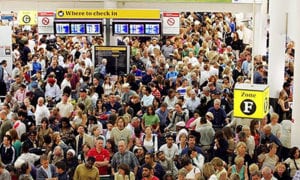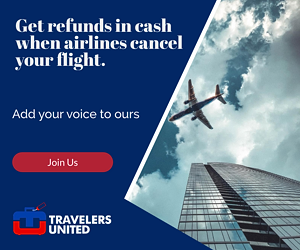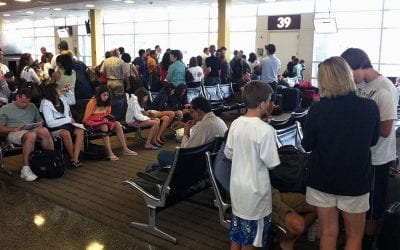5 airport danger points where infrequent fliers slow things down.

Infrequent fliers need to prepare for these five danger points.
1. Check-in kiosks
Humans are expensive, so airlines try to use as few of them as possible. This means that most airport check-in is done at kiosks, which work reasonably well if passengers are used to them. But to infrequent fliers, these automatic check-in kiosks can be daunting — “My confirmation number? What’s that?” “Scan what? Where?” etc. etc. I’ve noticed some airlines having humans in the area to help, but confused infrequent fliers can slow things down. Plus, airlines also want passengers to print their own baggage tags, which even as a regular traveler I find complicated at times to attach to a bag. To help avoid problems with kiosks, try to check in online in advance. I personally also find that paper boarding passes can be much faster than those on phones.
READ ALSO ON TRAVELERS UNITED: 8 factors to help decide how early to get to the airport
 2. Baggage issues
2. Baggage issues
At this point, even the most infrequent travelers know that — Southwest Airlines excepted — airlines charge for checked bags. However, not everyone knows that there are weight limits, and that a heavier bag or a second or third bag can be much more expensive than a basic fee. Add to this that infrequent fliers don’t have status to waive the fees, and it creates some stressful times at the counter. (Increasingly, I’ve noticed — at United’s terminal at San Francisco International Airport, for example — “repacking areas,” for passengers to sort these problems out.)
To avoid infrequent flier problems, if travelers have frequent flier status, this is a good time to use the “Elite” or “Preferred” check-in desk, if available. Or, check baggage curbside.
3. TSA lines
Alas, this is pretty simple. The less someone travels, the less they are likely to know what can and cannot go through security screening. And in my experience, the Pre-Check line isn’t immune, since some PreCheck fliers bring along family members (children younger than 13 can go with their parents or guardians).
All delays are not caused by actual liquids, though that’s a biggie. Food items like pies and jelly can trigger liquid sensors, children’s toys can cause all sorts of fun, and women’s heels, for example, have metal spikes that set off alarms. The only way to improve this situation is to allow extra time.
4. Boarding
To their credit, airlines try hard to streamline the boarding process. But even the best systems aren’t infrequent-flier-proof, as confused travelers may not realize what group they are in. Or again, elite frequent travelers may have their family with them taking advantage of one person’s status. Then, once aboard it’s the overhead bin game. From people who don’t realize they aren’t supposed to stow their bags in the first available bins (to be fair, some know and do it anyway) to those who get aboard and then need to SLOWLY unpack their bags before sitting down,
There are also infrequent fliers who don’t get the carry-on rules. Basic Economy has made this uncertainty much worse. To be fair, airport personnel do their best, but many folks don’t get that no carry-on means NO carry-on. Or that being in a later boarding group means the chances of finding overhead bin space on a full flight could be slim to none. Again, the best advice: allow extra time. And if travelers aren’t in an earlier boarding group, either consider paying for priority boarding or just check the carry-on bag.
READ ALSO: How to make airline connections during holiday travel
5. Food

And, of course, always bring a sense of humor.

READ ALSO:
Bedbugs invade Paris — don’t bring them home
Why airline consumers have the rights of Medieval serfs
Janice Hough is a California-based travel agent a travel blogger and a part-time comedy writer. A frequent flier herself, she’s been doing battle with airlines, hotels, and other travel companies for over three decades. Besides writing for Travelers United, Janice has a humor blog at Leftcoastsportsbabe.com (Warning, the political and sports humor therein does not represent the views of anyone but herself.)



